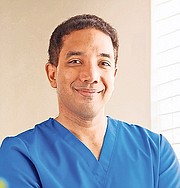By Greggory Pinto
The World Health Organisation (WHO) defines overweight and obesity as excessive or abnormal fat accumulation that leads to increased health risks. Overweight is defined as a body mass index BMI greater than 25 and obesity is defined as a BMI greater than 30.
Obesity is a national health crisis in the Bahamas.
Urology like every other medical field has numerous health conditions related to obesity.
Obesity and COVID-19
During this COVID-19 pandemic, many of the sickest coronavirus patients are obese.
A meta analysis of multiple scientific COVID-19 studies involving nearly 400,000 patients, which was published in the August 2020 edition of Obesity Reviews, found that obese patients with COVID-19 were 113 percent more likely to need hospitalisation, have a 74 percent greater likelihood of needing ICU care and 48 percent more likely to die from COVID-19.
Those are sobering and terrifying statistics. Do you still have no time to get regular exercise or need further compelling evidence to watch your diet and lose weight? Obesity is associated with chronic inflammation, reduced immunity and increased chance of blood clotting, which all play crucial roles in making COVID-19 more deadly in obese persons.
Obesity and prostate cancer
There is compelling evidence that obesity in men is linked to a higher incidence of a more aggressive forms of prostate cancer and there is a strong correlation between obesity and the spread of prostate cancer.
Obesity doesn't necessary cause prostate cancer but makes survival of prostate cancer more difficult.
Obesity and male infertility
Obesity can be associated with lower testosterone levels and poorer sperm quality and reduced sperm motility. A Denmark scientific study involving over 15,000 young men, found overweight men had on average a 24 percent reduction in sperm counts.
Obesity and erectile dysfunction
Obesity is a strong risk factor for erectile dysfunction, as are diabetes mellitus, hypertension, high cholesterol and cardiovascular disease.
Obesity increases the risk of erectile dysfunction ED by as much as 30 to 90 percent when compared to normal weight individuals, depending on the scientific study.
Obesity can lead to ED by damaging blood vessels, leading to lower testosterone levels and leading to increased inflammation
Obesity and kidney stones
Obese individuals excrete more calcium and uric acid in their urine than normal body mass index range persons and thus are more prone to produce calcium containing kidney stones.
Metabolic syndrome is a group of systemic disorders that is associated with increased cardiovascular risk and kidney stone formation. Metabolic syndrome involves three or more of the following conditions: hypertension, insulin resistance, low high-density lipoprotein cholesterol and high low-density lipoprotein cholesterol and obesity.
Obesity and low testosterone
Men with low testosterone are more likely to be obese and obese men are more likely to have low testosterone; a vicious cycle. Testosterone is metabolized to estrogen by fat cells and thus lowers testosterone levels. Obesity also lowers the sex hormone binding globulin, a protein that carries testosterone in the blood.
Obesity and kidney cancer
Obesity is a recognised risk factor for developing kidney cancer; with other risk factors including smoking, advanced age, and certain genetic disorders. The link between obesity and kidney cancer is complex and determined by factors such as increased levels of insulin, changes in the immune system, changes in cholesterol metabolism, and increased oestrogen levels.
Obesity and urinary tract infections
Obese individuals have increased adipose tissue that leads to inflammation that further leads to a reduction in the immune system, which can increase the likelihood of urinary tract infections. Higher levels of glucose in urine can enhance bacteria growth in persons with obesity as well.
Obesity is an overwhelming health problem in the Bahamas and worldwide. Multiple negative health consequences of obesity include cardiovascular disease, hypertension, diabetes, several cancers and the urological conditions outlined.
Eat healthy, get regular exercise and get annual or bi-annual health physicals.
• Dr Greggory Pinto is a board certified Bahamian urologist and laparoscopic surgeon. He has trained in Germany, South Africa and France, and is a member of the European Association of Urology. He can be contacted at OakTree Medical Center, #2 Fifth Terrace & Mount Royal Avenue. Telephone: (242) 322-1145 (6) (7); e-mail: welcome@urologycarebahamas.com, or visit the website:www.urologycarebahamas.com.





Comments
Use the comment form below to begin a discussion about this content.
Sign in to comment
OpenID